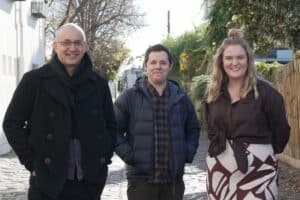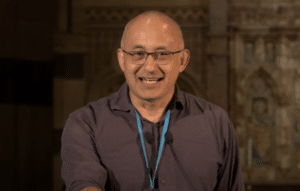
Glenn Loughrey
15 October 2023
Over the last six months I have travelled across Australia educating and advocating for the Statement from the Heart, recognition, and a Voice. What began as a hopeful project has descending into trench warfare, hand to hand combat on all sides. Or, that is how it feels.
It began as a response to Malcom Turnbull’s government’s request for our people to define what recognition in the constitution would mean, and as a commitment by the new Albanese government to implement the Statement in full. It has become a battle, not for the hearts and souls of Australians, but for political power. I believe this is fuelled by a desire for revenge over losing power, and the fear arising from the stealing of another’s land and the subsequent failure to exterminate them from it.
Read more: ‘Respect First People’s mental suffering, whatever Voice outcome’
This may seem a harsh assessment, but it is based on 110 presentations, encounters, interviews, and discussions with Australians inside and outside the church. I expected the vitriol in the comment sections of newspapers, letter to editors, TV talk shows, particular news outlets, and experienced face-to-face. But I had hoped this would disappear in a bipartisanship repair of the failures of the past and recognise us through a voice enshrined in the constitution.
What I have heard, seen and experienced cannot be deleted from my memory. Like the vitriol from all sides against Lidia Thorpe, Linda Burney, Warren Mundine, and others, I have had my unfair share. It takes its toll and should not be tolerated, whoever the target. A sadness here is that the onlookers, the public, and those in power, do not call it out. Social and mainstream media claim free speech, and let the most awful things be said to and about those they do not agree with.
For me the sadness is that it comes from within the institutional church I serve, from those who claim to serve Christ in this world. The best barometer for how the wider church thinks are diocesan synods. At point of writing, I have done four synods and the National Bishops’ conference. At most I have not felt welcomed with little interaction with those attending except when I initiated it. The responses to my talks have been polite with the underlying sense of, “How dare he speak to us this way?” The motions put have carefully avoided declaring support for the proposal, instead benignly asking Australians to carefully consider the question before voting.
Read more: ‘This is about people not politics’: A personal reflection on the Voice
Based on these events, at best I would say the church is split in favour of “No” on this question, unlike in 1967 when the church asked its people to “Vote Yes for the Aborigines”. If my assumption is correct, then the church, like society, has become more unsafe for our people. It will become more unsafe after the referendum, regardless of the outcome, because this issue seems to have given permission for racism to be spoken freely.
My sadness deepens when I contemplate this refusal to accept our people’s generous invitation of transformational forgiveness: to walk together to repair the fracture in our society. The damage done to our people and our country came with the “occupation” by those made no attempt to legally be here. It was compounded when we were left out of the constitution. This was for two reasons: the belief we were dying out and it was only a matter of time before we would not exist, and as Australia was the last white supremacy project there was no room for colour. Yet the response in the 21st century to our seeking our rightful place as equals in the constitution and with a Voice on matters affecting us has been FUD – fake, unsubstantiated, misinformation – drowning out opportunity to do justice.
I am even more sad when I consider the almost 80 per cent of our people who support recognition and Voice. It is inconceivable to me that Australia appears to be dismissing the majority in favour of a loud minority. This odd mantra of “if not all Aboriginal and Torres Strait Islanders agree, I must say no” is irrational but very real. Nowhere else do we make decisions on the basis that not all Australians like a piece of legislation. Normally, the decision favours the majority. So why are we pulling this out now?
Imagine what it will mean for First Peoples to gather in groups, to worship, be at synod or just walk down the street, when we know that most of our fellow Australians have rejected our generous invitation of recognition and Voice? It will feel unsafe and threatening. It is the reason I did not attend synod in person. The journey of the last few months on the road with the Voice has allowed me to see deep into the psyche of Australia, and unfortunately the Church and it is disturbing. Once seen cannot be unseen.
Much work will need to be done to ensure future Australia, and the church, are safe places for First Peoples to be. This will involve not just reconciliation action plans but real action that puts us at the centre of society and institutions such as the church. The empty words of promises made and continually broken means we will put little stock in anything but real inclusion and action. First People need to be seen in leadership positions, not just for their own people, but for all and not in a tokenistic way that ticks the boxes, but with real power to change the structures that prevent our people taking their rightful place as equals.
The Reverend Canon Uncle Glenn Loughrey is vicar of St Oswald’s Glen Iris and chair of the National Aboriginal and Torres Strait Islander Anglican Council.






